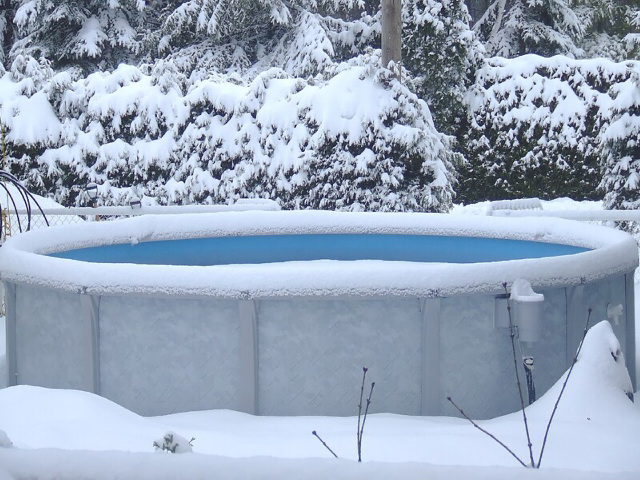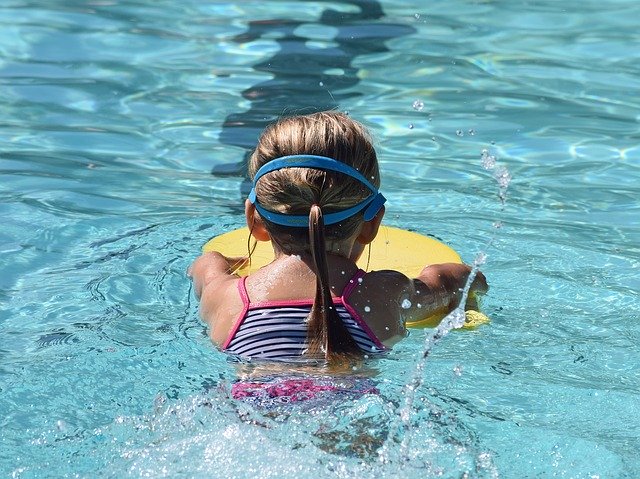When you’re not swimming in your pool, you, the kids, and your partner are in your RV traveling the globe. You usually winterize your swimming pool with pool antifreeze, but you ran out. Can you use RV antifreeze interchangeably?
RV antifreeze is safe to use in a swimming pool because it’s non-toxic and shares the same formula. The product will safeguard your pool pipes against temperatures as low as -40°F.
This guide to using antifreeze in your swimming pool will answer your most burning questions, including whether RV antifreeze is different from automobile antifreeze, what to do if you use the wrong kind of antifreeze, and how safe the stuff is.
Let’s begin!

Article Contents
Is RV Antifreeze the Same as Pool Antifreeze?
If you read our post on swimming pool chlorine, then you’ll recall how not all types are the same by far. When it comes to antifreeze though, that’s not exactly the case.
RV antifreeze and swimming pool antifreeze are the same product.
The antifreeze includes a base of either propylene glycol or ethanol. The former is more common of swimming pool antifreeze. Propylene glycol is a colorless syrup-like liquid with a very faint smell. It’s in everything from dog food to cosmetics and salad dressing.
Ethanol has no color as well, although its consistency is more like water than syrup. This simple alcohol goes into solvents as well as edible spirits such as liquor, beer, and wine.
Some types of RV antifreeze combine both ethanol and propylene glycol, but these products are not as common. If that’s the type of antifreeze you buy, it’s still usable in your pool, but it’s recommended you dilute the mixture with water first.
RV and swimming pool antifreezes come in a variety of colors depending on the manufacturer and the base ingredients. The antifreeze is usually pink or red but can also be blue or fuchsia. The dye makes it easier to determine how much antifreeze you’re using so you don’t overdo it.
Related Reading: Is Antifreeze Necessary for Closing Your Pool? (Winterization)
Is Car or Motor Antifreeze OK in a Pool?
Car or automotive antifreeze should never be used to winterize or close a swimming pool. It is toxic to people, animals and plants.
Interestingly, while the type of antifreeze you’d use in your RV and swimming pool are one and the same, that’s not the case for automobile antifreeze versus RV antifreeze. Automotive antifreeze is usually based on Ethylene Glycol. If ingested, the CDC says it can cause nausea, coma, loss of reflexes and even death.
A standard car antifreeze is only used to prevent the car cooling system freezing, whereas RV antifreeze can remove ice, improve the plumbing, and protect the water tanks.
Another difference is the inclusion of additives, which car or motor antifreeze may possess at a rate of 10 percent. The other 90 percent is either ethanol, propylene glycol, or a mix.
Some of the additives that may be featured in car/motor antifreeze are as follows.
Sodium Benzoate
When you add a sodium ion to benzoic acid’s carboxyl group instead of a proton, you get sodium benzoate. This sodium salt is organic in nature and is mostly used to prevent fungi from developing on food.
Silicate
Another type of salt found in motor antifreeze is silicate. This is an anion that includes oxygen and silicon. Its application is mostly for binding, such as cement. You’ll also find silicate in refractory insulation boards and cardboard adhesives.
Phosphate
Derived from phosphorus minerals, phosphate is a type of ion or charged particle that’s an anion and yet a third type of salt. Phosphate can become the base for phosphoric acid, which is used in electronics, cosmetics, and food.
Nitrite
By deprotonating nitrous acid, the result is nitrite. This oxoanion can become nitric oxide, which the body uses to lessen blood pressure and dilate blood vessels.
Borate
Finally, motor antifreeze usually contains borate, a compound that’s comprised of oxygen and boron. Borate is typically used for bleaching and stain removal, but it can also soften water. You mostly see this ingredient in commercial detergents.
As learning about those ingredients might have indicated, you should not put car antifreeze in your swimming pool. The additives can be highly irritating!
Since car/motor antifreeze and RV antifreeze come in a range of colors, you must read the label carefully to be sure of which kind you’re buying.
What to Do If You Accidentally Use the Wrong Antifreeze
You hadn’t been aware that antifreeze wasn’t entirely interchangeable until you read this post. The problem is that you already added car/motor antifreeze to your swimming pool thinking it would be okay. Now what do you do?
Well, if you’re pouring antifreeze through your pool pipes, you’re usually about at the end of the swimming season anyway. That said, if anyone is still using the pool at this point in the season, we recommend keeping them out until you can get this issue sorted.
As we mentioned in the last section, the additives used in car/motor antifreeze aren’t safe for exposure, and that goes for your family members and your pets.
How do you get rid of the antifreeze once you’ve added it?
First of all, assuming it’s only in the pipes and skimmer and not the actual pool, you’ll need to manually remove as much as you can. It’s important to do a thorough job on this.
Start with a shop vac to suck out the antifreeze or blow out the pipes. Make sure you have a container to catch it.
Next, you want to suck the antifreeze out of the skimmer box using a pump. Get as much as you can out of the skimmer. You don’t want that stuff being circulated back through the pool.
Whilst you shouldn’t add any type of antifreeze to pool equipment, if you did add it, you’ll need to drain the equipment and rinse it out thoroughly.
After you’ve removed as much antifreeze as possible, you can go ahead and prime the pump and fill the skimmer back up with freeze pool water. Set the filter to waste, or if you have a cartridge filter, set the valve to the waste setting and switch on the pump. This will suck in uncontaminated pool water and wash the pipes out without putting anything back into the pool.
You should be good to go now.
What if Car or Automotive Antifreeze Got in the Pool Water
Well, this is a bit more tricky. Do not swim in the water. Depending on how much got in, you may need to drain your pool and refill it with fresh, uncontaminated water.
If you have any doubts, I suggest you call your local pool pro.
Is It Safe to Swim with Antifreeze in the Water?

All this has you concerned. Is swimming in a pool that still has antifreeze in the water safe?
If the antifreeze is formulated for RVs or swimming pools, you can safely swim in the pool. These antifreezes are non-toxic for people and pets alike, so even if your dog enjoys swimming with the family, their health is not at risk.
Car/motor antifreeze though is toxic, especially if the stuff is swallowed (such as young kids accidentally swallowing pool water). Ingesting antifreeze mixed with pool water is less dangerous than straight-up drinking the stuff but is still not good for one’s health.
The body must metabolize the antifreeze, so it can take hours for antifreeze poisoning symptoms to manifest. Those symptoms are seizures, nausea, vomiting, euphoria, headache, fatigue, dizziness, slurred speech, and lack of coordination.
If you suspect that you or someone in your family has antifreeze poisoning, contact emergency medical services immediately.
For more about reopening your pool, check out our article: How To Open An Inground Swimming Pool In 8 Steps
Conclusion
RV antifreeze is okay for a swimming pool, but car/motor antifreeze definitely is not. The latter contains additives that may be toxic to your family, including your four-legged friends! It always helps to triple-check your antifreeze label before you add it to your pool.
Related Reading: How to Winterize Inground Pool

